- Home
- Milan Kundera
Eduard & God Page 4
Eduard & God Read online
Page 4
It was humiliating, terribly humiliating. The train idyllically clattered over the joints of the tracks (the girl was chattering) and Eduard said:
"Alice, are you happy?"
"Yes," said Alice.
"I'm miserable," said Eduard.
"What, are you crazy?" said Alice.
"We shouldn't have done it. It shouldn't have hap-pened."
"What's gotten into you? You're the one who wanted to do it!"
"Yes, I wanted to," said Eduard. "But that was my greatest mistake, for which God will never forgive me. It was a sin, Alice."
"Come on, what's happened to you?" asked the girl calmly. "You yourself always said that God wants love most of all!"
When Eduard heard Alice, after the fact, quietly appropriating the theological sophistries with which he had so unsuccessfully taken the field a while ago, fury seized him: "I said that to test you. Now I've found out how faithful you are to God! And a person who is capable of betraying God is capable of betraying a man a hundred times more easily!"
Alice always found ready answers, but it would have been better for her if she hadn't, because they only provoked his vindictive rage. Eduard went on and on talking (in the end he used the words "nausea" and "physical disgust") until he did obtain from this placid and gentle face (finally!) sobs, tears, and moans.
"Goodbye," he said to her at the station, and he left her in tears. Only at home, several hours later, when this curious anger had subsided, did he understand all the consequences of what he had done: He imagined her body, which had pranced stark naked in front of him that morning, and when he realized that this beautiful body was lost to him because he himself, of his own free will, had driven it away, he called himself an idiot and had a mind to slap his own face.
But what had happened had happened, and it was no longer possible to change anything.
In order to be truthful, I must add that even if the idea of this beautiful body he had rejected caused Eduard a certain amount of grief, he coped with this loss fairly quickly. If the need for physical love had once tormented him and reduced him to a state of longing, it was the short-lived need of a recent arrival in the town. Eduard no longer suffered from this need. Once a week he visited the directress (habit had relieved his body of its initial anxieties), and he resolved to continue to visit her regularly until his position at the school was definitively clarified. Besides this, with increasing success he chased all sorts of other women and girls. As a consequence he began to appreciate far more the times when he was alone, and he became fond of solitary walks, which he sometimes combined (please devote a bit of attention to this detail) with a visit to the church.
No, don't worry, Eduard did not begin to believe in God. I have no intention of crowning my story with such a flagrant paradox. But even if Eduard was almost certain that God did not exist, he turned toward the idea of God with yearning.
God is essence itself, whereas Eduard never found (and a number of years have passed since his adventures with the directress and with Alice) anything essential in his love affairs, or in his teaching, or in his thoughts. He is too honest to concede that he finds the essential in the unessential, but he is too weak not to long secretly for the essential.
Ah, ladies and gentlemen, a man lives a sad life when he cannot take anything or anyone seriously!
And that is why Eduard longs for God, for God alone is relieved of the distracting obligation of appearing and can merely be; for he alone constitutes (he alone, unique and nonexistent) the essential antithesis of this world, which is all the more existent for being unessential.
And so Eduard occasionally sits in church and looks dreamily at the cupola. Let us take leave of him at just such a time: It is afternoon, the church is quiet and empty. Eduard is sitting in a wooden pew and feeling sad at the thought that God does not exist. But just at this moment his sadness is so great that suddenly from its depth emerges the genuine living face of God. Look! It's true! Eduard is smiling! He is smiling, and his smile is happy.
Please keep him in your memory with this smile.

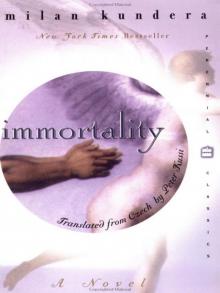 Immortality
Immortality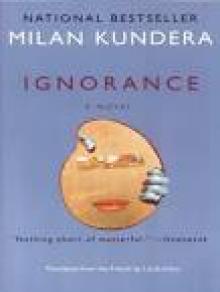 Dr. Havel After Twenty Years
Dr. Havel After Twenty Years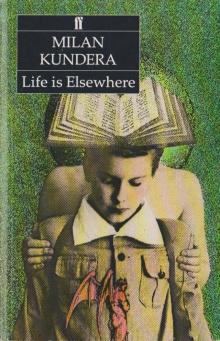 Life Is Elsewhere
Life Is Elsewhere Laughable Loves
Laughable Loves Symposium
Symposium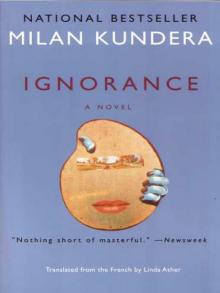 Ignorance
Ignorance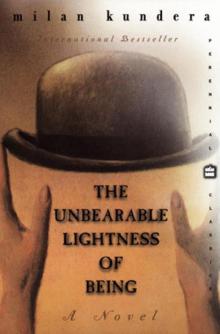 The Unbearable Lightness of Being
The Unbearable Lightness of Being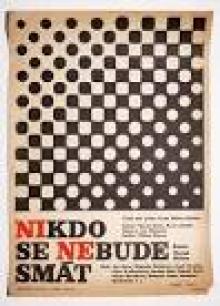 Nobody Will Laugh
Nobody Will Laugh Jacques and His Master: An Homage to Diderot in Three Acts
Jacques and His Master: An Homage to Diderot in Three Acts The Golden Apple of Eternal Desire
The Golden Apple of Eternal Desire Eduard & God
Eduard & God Slowness
Slowness Let the Old Dead Make Room for the New Dead
Let the Old Dead Make Room for the New Dead Farewell Waltz
Farewell Waltz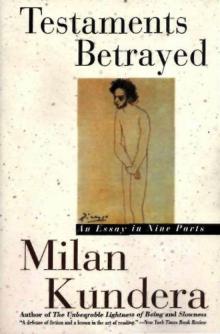 Testaments Betrayed: An Essay in Nine Parts
Testaments Betrayed: An Essay in Nine Parts